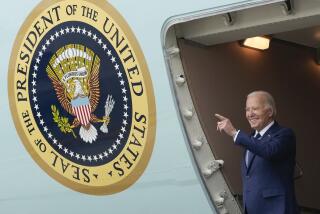A not-so-secret Clinton weapon
- Share via
ARLINGTON, VA. — Harold M. Ickes never forgets a favor, especially if he’s the one who did the favor. So the veteran political operative made sure that, when the time was right, he alone would call Garry Shay, former chairman of the Los Angeles County Democratic Party. As Ickes saw it, he had helped Shay; now he was looking for Shay to help him.
And once Ickes started calling, he didn’t stop until Shay said the words Ickes wanted to hear -- that he would support Sen. Hillary Rodham Clinton of New York at the Democratic National Convention in Denver in August.
Shay, as a member of the Democratic National Committee, is a superdelegate, one of nearly 800 elected officials, party leaders and activists who -- with the state primaries and caucuses now expected to end in stalemate -- may effectively end up picking the 2008 Democratic candidate for president.
And the man in charge of Clinton’s feverish effort to lock up superdelegates is Ickes, whose enthusiasm for no-holds-barred politics sometimes rattles friends and foes alike. Ickes once got so carried away that he bit another political operative on the leg. Now, some 35 years later, at age 68, he has mellowed so little that it could happen again.
“It depends on how heated the circumstances are,” he says.
Mythic qualities
Aggressive, profane, openly scornful of rivals, Ickes rules Clinton’s superdelegate operation with an intimidating style and a mythic persona. He is “advisor, consigliere, enforcer and strategist” all rolled into one, says Dick Harpootlian, a former chairman of the South Carolina Democratic Party who backs Obama.
What’s more, Harpootlian says: “He’s like a shadow. You hear he’s here, you hear he’s there, but you never actually see him.”
Ickes comes by his temperament and his passion for politics naturally. He is the son and namesake of President Franklin D. Roosevelt’s famously irascible Interior secretary. And he has played the role of party maverick for decades.
He worked in Sen. Eugene McCarthy’s 1968 campaign to unseat President Lyndon B. Johnson. He joined Sen. Edward M. Kennedy (D-Mass.) in trying to deny President Carter renomination in 1980. He worked for Jesse Jackson’s presidential bids in 1984 and 1988.
Unhappy about the way Jackson was being treated at the ’88 convention, Ickes hatched plans that included a threat to hand out 1,700 plastic whistles to Jackson supporters so they could disrupt the proceedings. Some of his ideas unnerved even Jackson; Ickes remembers him saying, “Ickes, you want to get me run out of white man’s America.”
Even inside the Clinton court, Ickes does not hold back. Last year, when senior Clinton aide Mark Penn appeared not to grasp the basics of delegate selection, Ickes mockingly asked, “Could it be that the vaunted ‘chief strategist’ of the vaunted Hillary Clinton campaign does not understand?”
In a Clinton campaign that can seem machinelike, Ickes is conspicuous for his idiosyncrasies. A female aide said that when she noticed his dress shirt unbuttoned practically to the navel, it was like glimpsing an unzipped fly.
“I thought someone should have pulled him aside to tell him. I later came to realize that’s how he wears his shirts.”
Temperament and eccentricities aside, with the importance of the superdelegates increasing Ickes now carries a burden that may be second only to the candidate’s own. Clinton is ahead among superdelegates, but the margin has been slipping. In December, she led Obama by 106 superdelegates. In early February, the number was down to 87. Today it is 36, according to Associated Press surveys.
Ickes runs the superdelegate operation from a third-floor war room in this suburb across the Potomac River from the capital. About 20 aides are divided into teams. One woos the uncommitted; another works to prevent defections.
The intensity of the struggle was reflected in a recent note on Ickes’ office door happily declaring that three Democratic congressmen were sticking with Clinton -- Bill Pascrell Jr. of New Jersey, Gregory W. Meeks of New York and Emanuel Cleaver II of Missouri:
“Pascrell and Meeks said they were ‘100 percent’ for Clinton through the convention, and Cleaver said he would vote for her unless he died first,” the note read.
Doing his homework
In courting the uncommitted, “the first order of business” is finding out “Who is this person?” Ickes said recently over an omelet of egg white, onion and tomato. “What is his or her political history? Who does that person associate with or rely on for information they take into account when making political decisions?”
To get answers, aides sit at computers ranged along a windowless hallway outside Ickes’ office. They sift websites; do Google searches; talk to friends, lobbyists, campaign donors -- tapping into what Ickes calls the sprawling network of “Clinton alumni.”
“You establish a relationship and keep going back, and people become friendlier and let down their guard,” Ickes said, describing the campaign’s methods. “And before you know it, you can pick up useful information. None of this is insidious information; it’s information about what makes a person tick politically.”
Ready to pounce
In the case of Shay, Ickes remembered that Shay had wanted to increase the representation of gays and lesbians within the national party. Ickes helped him over the years, speaking out in favor of Shay’s project at DNC meetings.
Initially, Shay committed to former North Carolina Sen. John Edwards, so Ickes issued a standing order to his staff: Make sure that when Edwards dropped out, Ickes -- and only Ickes -- called Shay. As Edwards’ fortunes sagged, Ickes began calling to chat up Shay every couple of weeks.
And on Jan. 30, just before Edwards publicly quit the race, Ickes pounced.
“Look, personal relationships, especially when you’re dealing with this at the individual level, are sometimes very helpful,” Ickes said later. “I have no reservations about calling in a chit. I don’t know if I had a chit with him to call in, but I do think that our prior relationship and the fact that I was helpful may have been helpful in persuading him to be for Hillary.”
Shay, for his part, says several factors played into his decision, including the fact that he liked Clinton’s performance in the Los Angeles debate and that Barack Obama never called him. But he credits Ickes with keeping Clinton “within the forefront” of his mind, and in fact he committed to her very soon after Ickes placed the critical call.
“In politics, you try to move and close the deal quickly,” Ickes said.
Eyeing the inconceivable
Only months ago, most people gave little thought to the superdelegates. Clinton seemed invincible. And for Democrats at least, the idea of uncommitted delegates picking the nominee evoked images of political bosses in smoke-filled rooms. Returning to that era was inconceivable.
But 2008 may be the year of the inconceivable -- not just the year a woman or an African American might be elected president, but the year the Democratic nominee was chosen by delegates unconstrained by the popular vote.
Ickes recognized early on how important those delegates might be. And, in assigning him responsibility for them, Clinton chose a veteran whose loyalty was proven -- and whose iron focus on the goal at hand matched her own.
Both the loyalty and the focus were on display in February 1999, when the Senate voted not to remove Bill Clinton from office.
In the White House residence, Ickes and the first lady were poring over New York state maps in preparation for her Senate bid.
A call came in informing the first lady that her husband had been acquitted, Ickes recalled. “She puts down the phone and says, ‘Harold, we were talking about Buffalo.’ ”
With that, they went back to work.
What mere superdelegate could withstand determination like that?
--
More to Read
Get the L.A. Times Politics newsletter
Deeply reported insights into legislation, politics and policy from Sacramento, Washington and beyond. In your inbox three times per week.
You may occasionally receive promotional content from the Los Angeles Times.










